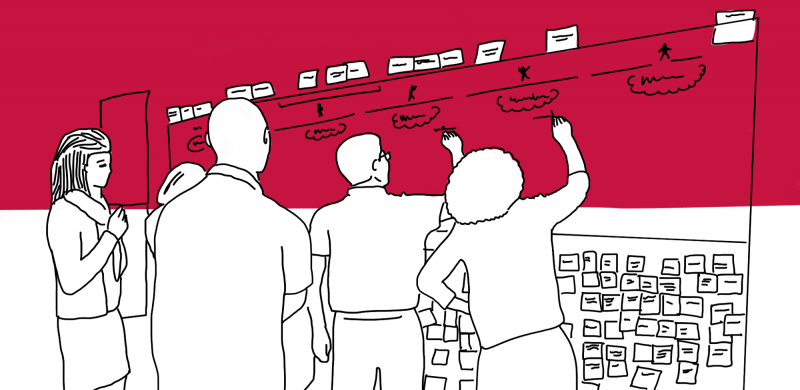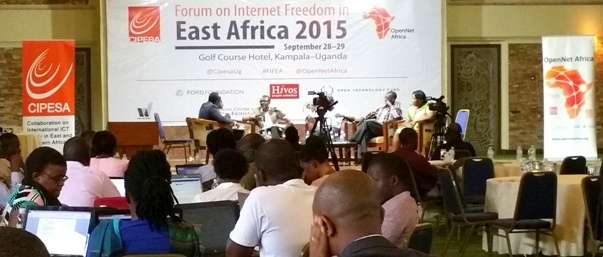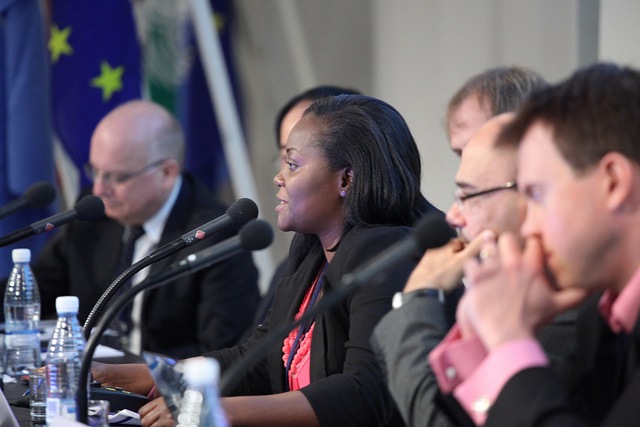Last week, we asked “What is Service Design?” and answered our question with “Service design is the process of taking a service and better tailoring it to the needs and wants of the end user, whether that’s a client, customer or in the case of civic service design, the citizen. It could be improving an existing service, or creating a new service totally from scratch.”
On December 5th, Pollicy and the Collaboration in International ICT Policy for Eastern and Southern Africa (CIPESA) brought back the civic technology community in Uganda, but this time, with a focus on data and design. As issues of data ownership, digital security, censorship become more pertinent in our society, so does the need to appropriately harness the benefits of big data. Through a series of interesting panel discussions, lightening talks and a hands-on design training, we took participants through a journey on how data can be used to revolutionize how citizens and governments interact for mutual benefit.
Are you a techie that's looking to harness technology and design for the public good?, SIGN UP to attend this event;
Civic Technology in Uganda: A Data & Design Perspective
Details:https://t.co/Z3pe8a5gB8 pic.twitter.com/WkjoZWGKd2
— Pollicy (@PollicyOrg) November 24, 2017
We first tackled the hard issues around the ethics of data in improving service delivery in Uganda through a panel discussion analyzing the issue from the perspective of the Ugandan Police Force, human rights defenders and the healthcare industry. Mr.Jimmy Haguma, the Acting Commissioner of Police — IT & IM, Mr.Neil Blazevic from DefendDefenders Tech Unit and Mr.Samson Jarso from Andromeda Innovations led the panel moderated by Pollicy’s own Patricia Navvuga.
"Every time we're using platforms linked to other platforms then we're no longer on private mode. The internet is public" – Jimmy Haguma on cyber security and safety #CivicTechUg #Uganda pic.twitter.com/CSkYZcIH7Q
— ICT4DemEA (@ICT4DemEA) December 5, 2017
Mr John Kalyesubula and Mr Francis Ddamulira (Not in Photos) from @UmemeLtd talking about how they are using big data to improve public service delivery #civictechug #bigdata #ict4dem pic.twitter.com/BpH25JM7wB
— Pollicy (@PollicyOrg) December 5, 2017
In the afternoon, after a networking lunch we came together as a group to tackle challenges using the principles of service design, facilitated by Design without Borders. Using a process of iterative prototyping, our faciliators Lawrence and Rachit discussed how they conduct user research, ideate and convert their ideas in prototypes which they extensive test with their end users until completely satisfied with the user journey.
The #servicedesign Process has a pretty simple formula;
1. Research
2. Ideation
3. Conceptualization
4. Prototyping
5. Testing
6. Implementation#CivicTechUg 🇺🇬 pic.twitter.com/WbISCxpAag— Pollicy (@PollicyOrg) December 5, 2017
Service design creates better citizen and staff experiences while at the same time reducing inefficiencies and increasing value to society. Think of all the time, money and mental energy saved by improving upon the processes listed below.
As small groups 6–7 participants, we tackled three main challenges:
1. Public Transport in Kampala in quite inefficient
2. Obtaining a new passport is troublesome
3. There is a lack of monitoring of public complaints
The teams take on the first step of Problem Definition in the process of #servicedesign pic.twitter.com/VhS9Epnh4n
— Pollicy (@PollicyOrg) December 5, 2017
From our discussions, we realized that the solutions could be readily implemented by thinking of the issues holistically. In the previous blog post, we looked at the example of acquiring a new passport here in Uganda, and quite fittingly worked on the same issue in one of the small groups.
The group, working through the National ID or a temporary National ID, presented a simple online solution for registering linked information and obtaining feedback throughout the process via e-mail, SMS and by logging into the online portal to check on the status of the submission.
For public transportation, a colour-coded and numbering system for public minibuses and buses was offered as a solution to ease unruly drivers, unknown bus routes and improve connections between routes. For public complaints monitoring, the AskYourGov system was offered as a potential solution by engaging numerous government officials through one centralized portal.
What we took away from the session was that even though we were able to come up with these ideas in 1–2 hours, the solutions seemed readily implementable. But looking at the service design processes, we need to do further research with end user and to first prototype these concepts with small groups of users to perfect the process.
Getting to work hands-on on current pressing issues in Uganda was an eye-opening experience and we hope to bring in more members of the civic technology community together with government to problem solve some of these challenges using data and design principles.
For more information on service design, check out the Service Design Toolkit: http://www.servicedesigntoolkit.org/ and content from Interaction Design Foundation: https://www.interaction-design.org/literature/topics/service-design
We’re thankful for everyone who showed up and remained engaged the entire time, and for our partner CIPESA on making this event possible!
On to the next!
We can choose to talk about #data and #civictech all day but we can only do so if we know each other. Folks got a chance to do an Ice-breaker to get to know each other over coffee. #CivicTechUg pic.twitter.com/tnqq8Z8PyI
— Pollicy (@PollicyOrg) December 5, 2017




